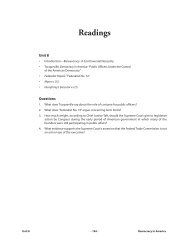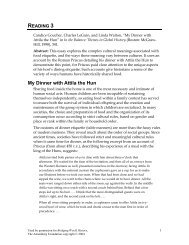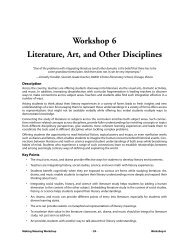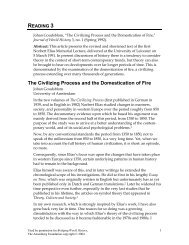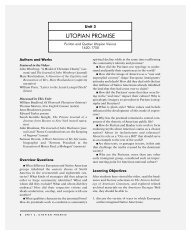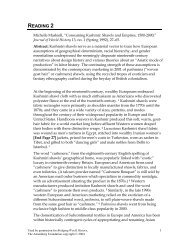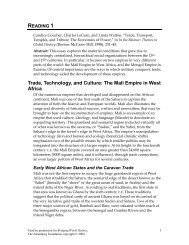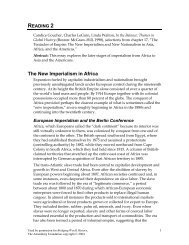Ethics Reader
Ethics Reader
Ethics Reader
Create successful ePaper yourself
Turn your PDF publications into a flip-book with our unique Google optimized e-Paper software.
and censure injustice, magnifying the rewards and honours of the one and abusing the other;<br />
that is a manner of arguing which, coming from them, I am ready to tolerate, but from you<br />
who have spent your whole life in the consideration of this question, unless I hear the<br />
contrary from your own lips, I expect something better. And therefore, I say, not only prove<br />
to us that justice is better than injustice, but show what they either of them do to the<br />
possessor of them, which makes the one to be a good and the other an evil, whether seen or<br />
unseen by gods and men.<br />
I had always admired the genius of Glaucon and Adeimantus, but on hearing these words I<br />
was quite delighted, and said: Sons of an illustrious father, that was not a bad beginning of<br />
the Elegiac verses which the admirer of Glaucon made in honour of you after you had<br />
distinguished yourselves at the battle of Megara:<br />
Sons of Ariston, divine offspring of an illustrious hero.<br />
The epithet is very appropriate, for there is something truly divine in being able to argue as<br />
you have done for the superiority of injustice, and remaining unconvinced by your own<br />
arguments. And I do believe that you are not convinced—this I infer from your general<br />
character, for had I judged only from your speeches I should have mistrusted you. But now,<br />
the greater my confidence in you, the greater is my difficulty in knowing what to say. For I<br />
am in a strait between two; on the one hand I feel that I am unequal to the task; and my<br />
inability is brought home to me by the fact that you were not satisfied with the answer which<br />
I made to Thrasymachus, proving, as I thought, the superiority which justice has over<br />
injustice. And yet I cannot refuse to help, while breath and speech remain to me; I am afraid<br />
that there would be an impiety in being present when justice is evil spoken of and not lifting<br />
up a hand in her defence. And therefore I had best give such help as I can.<br />
[Socrates, valuing the importance of education, moves step-by-step through a long involved argument. He<br />
begins with the meaning of virtue and the virtues to be sought, wisdom, courage, temperance and above all<br />
justice. These are the virtues needed in creating the ideal state. Once the value of these virtues in creating the<br />
ideal state is recognized, one can deduce their value also to the soul of the individual. In the course of<br />
developing his argument, Plato demonstrates how these virtues are necessary for survival first in the formation<br />
of the smallest state; then as it moves to a more stable entity and finally as the state gains wealth, the need for<br />
a standing army to protect the assets and material wealth of the state. He then describes the importance of the<br />
good soldier or Guardsman and the qualities inherent in such a person.]<br />
[Socrates continues.]<br />
And our State must once more enlarge; and this time the enlargement will be nothing short<br />
of a whole army, which will have to go out and fight with the invaders for all that we have,<br />
as well as for the things and persons whom we were describing above.<br />
Why? he said; are they not capable of defending themselves?<br />
No, I said; not if we were right in the principle which was acknowledged by all of us when<br />
we were framing the State: the principle, as you will remember, was that one man cannot<br />
practise many arts with success.<br />
Very true, he said.<br />
Page 33



